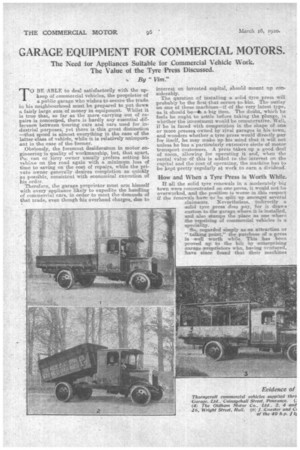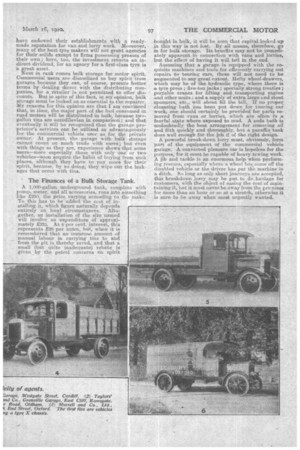GARAGE EQUIPMENT FOR COMMERCIAL MOTORS.
Page 8

Page 9

If you've noticed an error in this article please click here to report it so we can fix it.
The Need for Appliances Suitable for Commercial Vehicle Work. The Value of the Tyre Press Discussed.
By "Vim."
TO BE ABLE to deal satisfactorily with the upkeep of commercial vehicles, the proprietor of a public garage who wishes to secure the trade in his neighbourhood must he prepared to put down a fairly large sum of money in equipment. Whilst it is true that, so far as the mere carrying out of repairs is concerned, there is hardly any essential difference between -touring cars and cars used for industrial purposes, yet there is this great distinction —that speed is almost everything in the ease of the latter class of vehicle, while it is relatively unimportant in the ease of the former.
Obviously, the foremost desideratum in motor en-. gineering is quality of workmanship, but, that apart, tib.) van or lorry owner usually prefers setting his vehi,!ie on the road again with a minimum.loss of time to saving on the cost of repairs, while the private owner generally desires completion as quickly as possible, consistent with economical execution of
his order.
Therefore, the garage proprietor must arm himself with every appliance likely to expedite the handling of commercial cars, in order to meet he demands of that trade, even though 'his overhead charges, due to interest on invested capital, .elmuld mount up con. siderably. The question of installing a solid tyre press will probably be the first that occurs to. him. The outlay on one of these machines—if of the very latest type, as it should be—ilt a big item. The doubt, which he feels he ought to settle before taking the plunge, is whether the investment would be remunerative. Well, if he is faced with competition in the shape of one or more presses owned by rival garages in his town, and wonders whether a tyre press would directly pay for itself, he may make up his mind that it will not unless he has a particularly extensive circle of motor transport customers. A press takes up a good deal of room, allowing for operating it and, when the rental value al this is added to the interest on the capital and the cost of operating, the machine has to be Rept pretty regularly at work to earn a dividend.
How and When a Tyre Press is Worth While.
If all the solid tyre renewals in a moderately big town were concentrated on one press, it would not be overworked, and the position is worse in this respect if the leenewals hare to be split up amongst several .claimants. Nevertheless, indirectly a selid tyre .press doe,9 _pay, for it draws custom to the garage where it is installed, and also stamps the -place as one where the repairing of commercial vehicles is a speciality. -So, regarded simply an attraction or "talking point," the purchase of a press is well -worth while. This has been proved up to the hilt by enterprising -.garage proprietors who, having ventured, have since -found that their machines have endowed their establishments with a readymade reputation for van and lorry work. Moreover, many of the best tyre makers will not grant agencies for their solids except to firms possessing presses of their own ; here, too, the investment return.s an indirect dividend, for an agency for a first-class tyre is a great asset.
Next in rank comes bulk storage for motor spirit. Commercial users are disinclined to buy spirit from garages because they can, of course, procure better terms by dealing direct with the distributing companies, for a retailer is not permitted to offer discounts. But in .spite of this fact, in my opinion, bulk storage must be looked on as essential to the repairer. My reasons for this opinion are that I am convinced that, in time, the major part of the fuel consumed in road -motors will be distributedin hulk., because twogallon tins are antediluvian in comparison; and that eventually it will be recognized that the garage proprietor'S services can be utilized as advantageously for the eommercial vehicle user as for the private owner. At present, the garage with bulk storage cannot count on much trade with users ; but even with things as they are, experience shows that some users—more especially those with only one or two vehicles—soon acquire the habit of buying from such places, although they. have to pay more for their spirit,.because, by so doing, they wine out the leakages that occur with tins.
The Finances of a Bulk Storage Tank.
A 1,000-gallon underground tank, complete with pump, meter, and all accessories, runs into .something like 2250, the price varying according to the make.
To this has to be added the cost of in_ stalling it, which figure naturally depends entirely on local circumstances. Altogether, an installation of the size -named will involve an expenditure Of approximately ka'425.. At s per cent, interest, this represents 226 per amain, but, when it is remembered that an immense amount of manual labour in carrying tins to and from the pit.is thereby saved, and that a small .(but quite inadequate) rebate is given by the petrol concerns on spirit
bought in bulk, it will be seen that capital locked up in this way is not lost. By all means, therefore, go in for bulk storage. Its benefits may not be immediately apparent in connection with vans and lorries, but the effect of having it will tell in the end.
Assuming that a garage is equipped with the requisite machines and tools for efficiently carrying out repairs to touring cars, these will not need to be augmented to any great extent. Hefty wheel-drawers, which may be of the hydraulic type, where there is a tyre press; five-ton jacks ; specially strong trestles ; portable •cranes for lifting and transporting engine and other units ; and a supply of extra large and stout spanners, etc. will about fill the bill. If no proper, cleansing bad]. has been put down for touring car work, One should certainly be provided for parts re. moved from vans or lorries, which aim: often in a fearful state where exposed to mud. A soda bath is undoubtedly the best arrangement for removing oil and filth quickly and thoroughly, but a paraffin tank does well enough for the job if of the right design.
A powerful break-down lorry must, obviously, form part of the equipment of the commercial vehicle garage. A converted pleasure car is hopeless for the purpose, far it must be capable of heavy tewing work. A jib and tackle is an enormous help when performing' rescues, especially where a wheel has come off the disabled vehicle or the driver has put the machine in a ditch. Se long as only short journeys are accepted, this breakdown lorry may be put to do. haulage for customers, with the object of easing the cost of maintaining it, but it must never be.away from the premises for more than an hour or so at a Stretch, otherwise it is sure to be away when most urgently wanted.


























